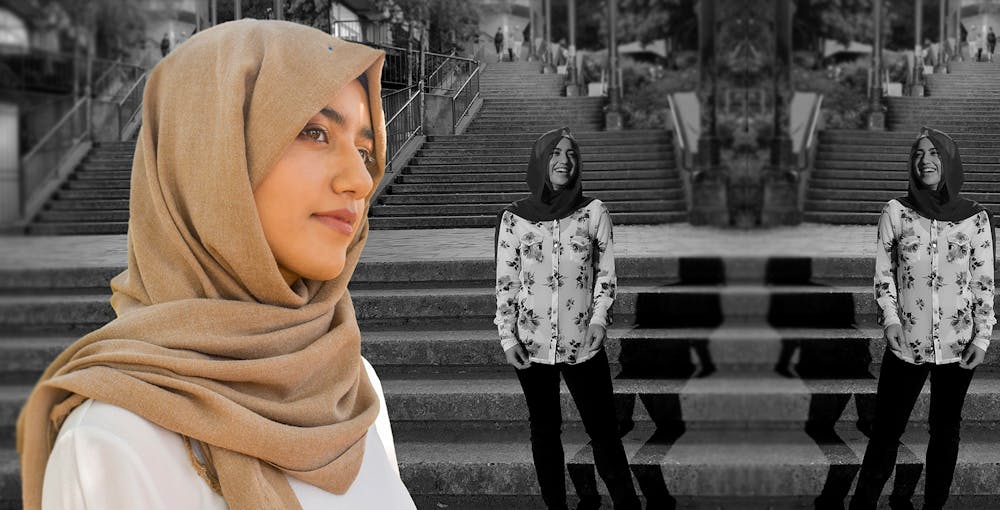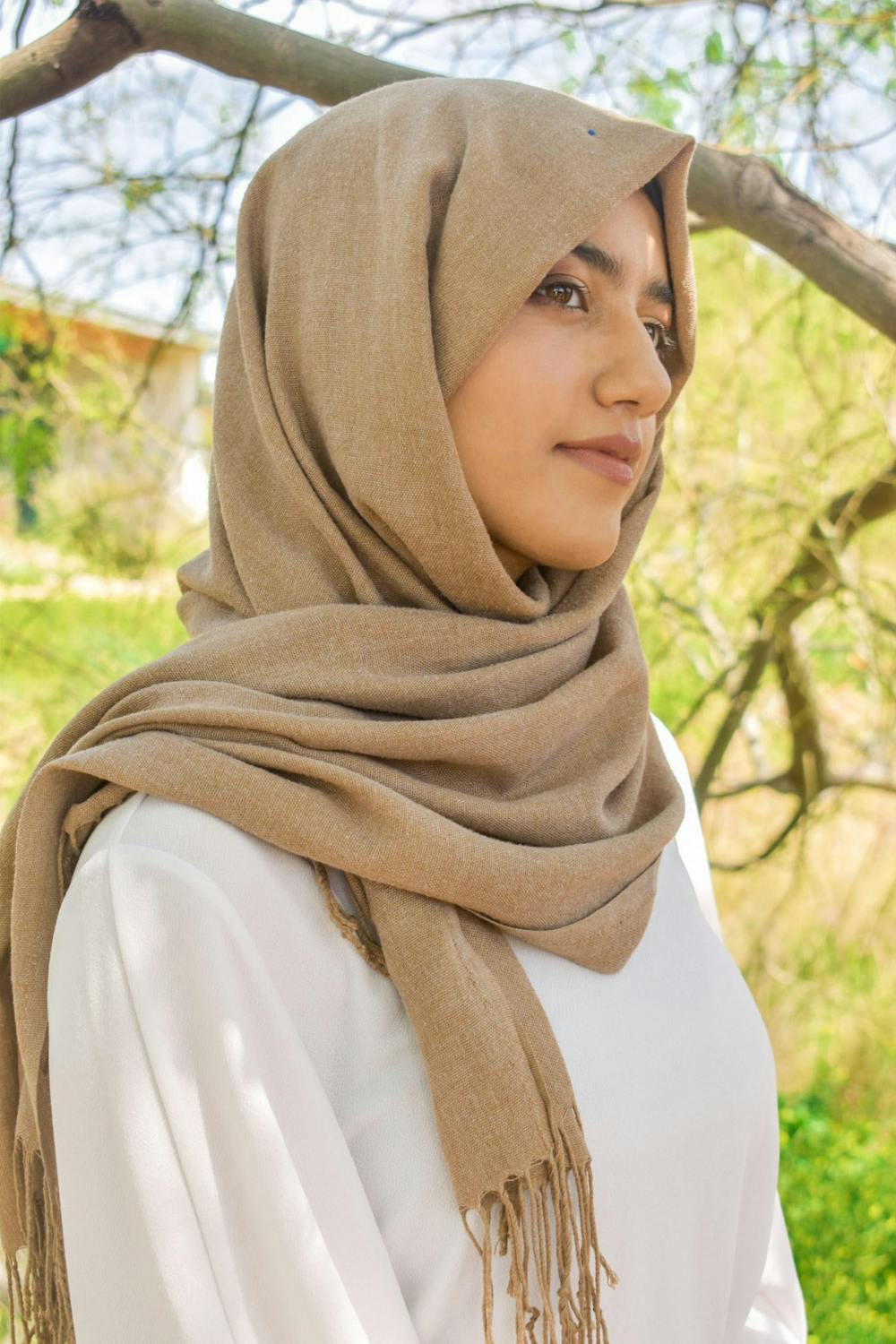Hajer Rahee is a junior studying molecular biosciences and biotechnology along with anthropology at ASU. She is also a first-generation Iraqi American Shia Muslim. As a child, she attended small Islamic or Muslim-friendly schools in the Phoenix metro area. Today, she is the outreach director for ASU's Muslim Student Association.
On Dec. 8, 2021 an individual unaffiliated with ASU entered Hayden Library's Interfaith Reflection Room and vandalized a Quran, in what multiple student organizations and the ASU Police Department have declared a hate crime. Rahee references this incident during the conversation.
Rahee does not speak for all Muslim students and she is often quick to point this out. Her thoughts, ideas and stories reflect the unique experiences of one person: herself.
How has your faith been important in your upbringing and now in your life as an adult?
In the beginning of college, I was really afraid. I mostly stuck with my Muslim friends, people I knew from high school or people I knew from the community.
I came from a strictly Muslim background with mostly Muslim friends. Going to ASU was this big shift to the majority of my peers not being Muslim. You walk into your normal "gen chem" classroom — like 200 students — and you look all around and you see, maybe five people wearing the headscarf.
Now, my view has definitely changed. I've done more to go out of my way and learn about other people. I don't think my faith should restrict me or be this alienating factor between me and other people.
During freshman year, there was this girl, we started becoming friends. We would just talk about our days and whatnot.
One time I mentioned I go to a mosque and she replied, "What is that?"
It was interesting seeing there was someone who didn't know what the Islamic place of worship is. I thought if I mentioned church everyone would know what it is. But a mosque was kind of foreign terminology to her.
Another time, my classmates and I were all taking turns meeting with a professor and reviewing our exams with him. My Muslim friend went to him after me on another day, and the professor was like, "Didn't I already speak to you?" He had never spoken to her before.
There's kind of this generalization about who Muslims are.
Wearing the headscarf is another alienating factor. Obviously I can’t speak for all of the faith, but, as a Muslim woman, when I walk into a room people will immediately assume, "Oh, she's Muslim." When that happens they might immediately think, "Woah, how do you approach this person?"
Do you feel like you're visible in a way that other students aren’t?
Definitely. I wouldn’t say that it's a huge, outstanding factor. I think there are enough Muslims that it’s kind of just accepted.
But when it comes to talking to people, I can see that they kind of struggle with figuring out how to approach us. People are afraid of saying something or doing something to offend us, so they're really cautious. Then, afterward, it gets awkward.
Do you feel like that happens with your peers in classrooms? Does it happen with faculty, administrators, even just strangers on the street?
It mostly happens between peers. Talking to people who are in the same class as you, I think that's the most intimate level of meeting people.
One time I was studying with one of my friends — he's non-Muslim. He was asking questions about my faith. It seemed clear this was his first time speaking closely to someone who practices Islam.
He asked, "So, like, was the scarf forced on you?" I was like, "No, I chose to wear it," and I told him the story of how I started wearing it.
I was pretty shocked to be asked that question. I expected there to be a general sensitivity around it, but I think that's not really the case.
So, is that an example of the opposite kind of thing, someone not being sensitive at all? Whereas other times people are too sensitive?
The thing is, I don't want to say he meant to be offensive, but I do believe this was him not really being sensitive to the topic. If you want to be careful how you word something you change the terminology you use.
Another time with a different person, we were talking and — unprovoked — they were just like, "Doesn't your guys' book say that you should kill all the infidels?"
I mean, I don’t even know what to say. I don't think you should ask me about this kind of topic. I'm not really super educated on it.
There's definitely a spectrum of how people react when they encounter a peer who is Muslim.
How does that make you feel? What does it mean that someone feels comfortable asking you incredibly insensitive questions about religious scripture?
This is very much just me, but it makes me laugh.
It's funny to me to see that sometimes people are not willing to go out of their way to learn about others. Sometimes they just say what they have already heard. I’m glad I was able to clear up some misconceptions about Muslims to those people.
There's this gap in understanding each other in terms of how Muslims and non-Muslims act.
What's something that you wish more non-Muslims knew about your faith and your community? What's something that you wish more people knew about you?
I wish they knew we're just like them, you know? I'm not a completely different entity or something.
I’m not not approachable just because I wear a hijab. There's a fear of offending us, but there's also the fear that maybe we're going to do something to them because of previous media representation and whatnot.
I think that's why when people did ask me offensive stuff, I didn't get mad. In a way, they're asking me something that's not really alienating.
They worded it in a way that makes it seem like an everyday question. Yeah, it was insensitive, but it made me laugh that this person didn't feel the need to be sensitive.
I'm not saying everyone shouldn't be sensitive, but I wish people weren't afraid.
People who practice Islam are an incredibly diverse group. Do you feel any aspects of your identity make your experience different from another Muslim person?
I definitely have a lot of privilege coming from my background. I am Arab; Islam was brought down to Arabs and then spread. So, there's this Arab superiority complex among the community.
At least, within the Muslim community, I'd say I have an easier time getting by … than someone who is brown or Desi or Black. I think there's a lot of discrimination and racism Black people have to deal with within their own communities, especially religious communities. I definitely recognize I have a lot of privilege.
What are some of the positives to being part of the Muslim community at ASU?
I feel like if I was ever going through something — let's say I fell in front of a group of people — I feel like if a Muslim saw me they would immediately come running. If my scarf fell off they'd just drop whatever they’re doing and come help me.
We have this unspoken solidarity. We all make sure to look out for each other.
Practicing a minority religion is something that gives me a chance to be more open-minded. I've kind of experienced the short end of the stick compared to other people.
Also, the school of thought I practice is even more of a minority within the Muslim community. I'm a Shia Muslim. This has given me an opportunity to really empathize with those who don’t have the same level of representation as non-minority groups on campus.
When you are on ASU campus, do you feel safe?
I would say, yeah.
I don't know if me saying this is also really naive. I've had people tell me to be more careful of my surroundings. I'm someone who doesn’t really pay attention to stuff like that. But, in general, I don't feel like my life is in danger. I would say that I do feel safe.
There's been a lot more effort, and I’m talking about within the student body. I think there's been more solidarity between student groups to protect those who've suffered from previous hate crimes or things like that.
Do you think the ASU administration makes the needs of Muslim students a priority?
I don't think they are making Muslim students a priority. Just in general, minority groups on campus do not get priority.
I'm sure you've heard about what happened in the Interfaith Room. There's a person who walked in, ripped up a Quran and destroyed the walls and whatnot. It was discovered that he wasn't an ASU student, he was just someone who came into the building and wanted to vandalize.
I think despite the fact that ASU is an open campus, there should be more efforts done to secure the buildings. Anyone can walk into a building at any time unless they’re locked.
So, do you feel like ASU is not doing a good job managing it’s safe spaces — religious spaces, sacred spaces?
I don't think I would go as far to say that they're not doing a good job. It's just that there could be additional steps to really make them secure.
After it was discovered that this person was not a student, people were really worried. It made me more aware of how easy it is for anyone to walk into a classroom or other building.
Is there anything else you want to talk about that I didn't ask you?
If I should mention anything, it's just that I want to put an emphasis on the need for both sides to come together and bridge this gap between us.
As long as we assume things about the other side, then we are not going to get anywhere.
This interview was edited for length and clarity.
Reach the reporter at ammoulto@asu.edu and follow @lexmoul on Twitter.
Like The State Press on Facebook and follow @statepress on Twitter.





